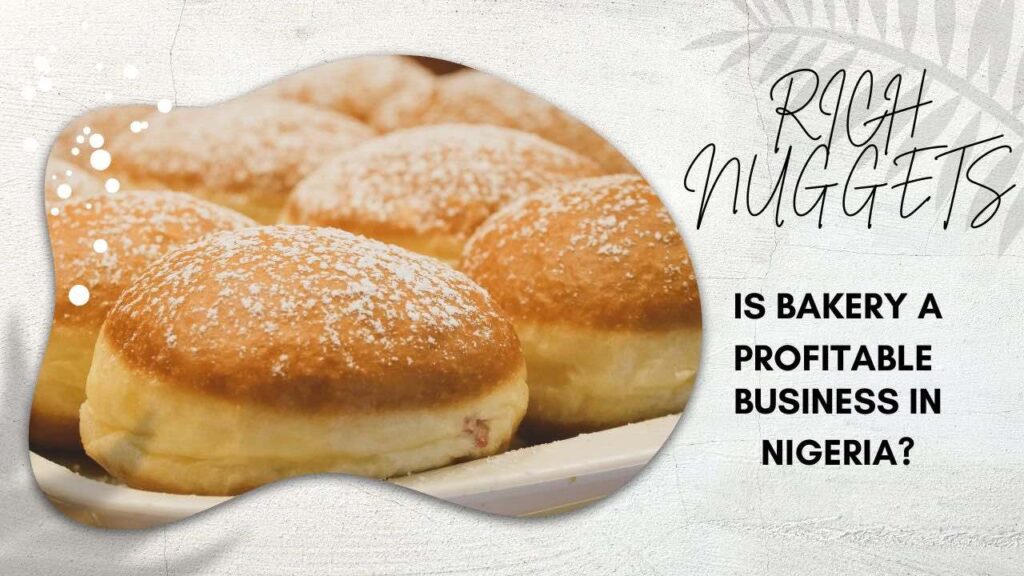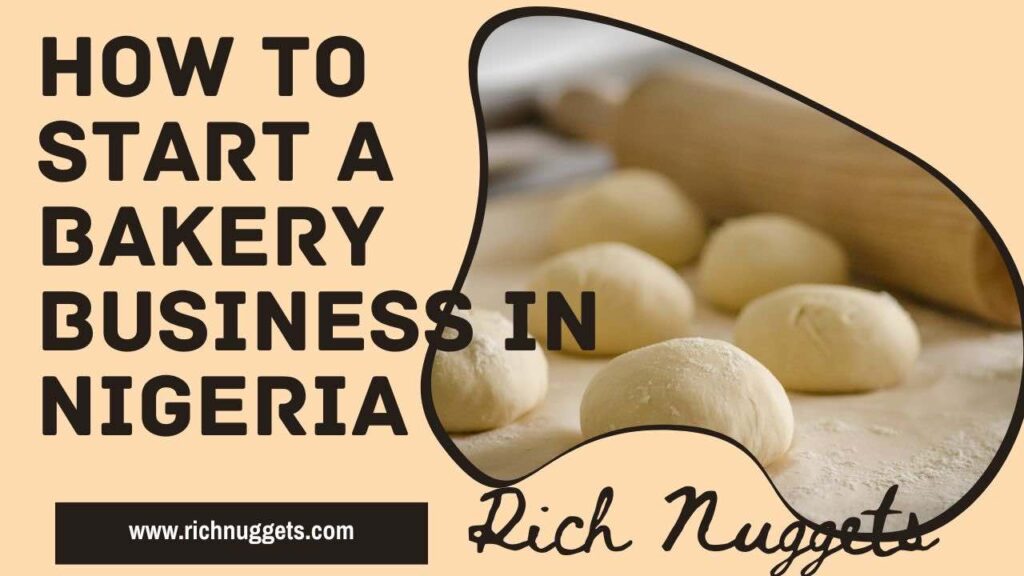
A bakery business is a segment of the food industry that specializes in the production and sales of various baked goods. These baked goods range in products such as bread, cakes, pastries, cookies, biscuits, and other baked treats.
Bakeries in Nigeria cater to the local population’s demand for affordable and convenient baked goods, and they can vary in size from small neighborhood bakeries to larger commercial establishments.
In this article, we will show you how to start a bakery business in Nigeria in a super easy way.
Table of Contents
Is Bakery a Profitable Business in Nigeria?

Yes, a bakery business is a profitable business in Nigeria. This is due to the consistently high demand for baked goods in Nigeria as a result of the widespread consumption of items like bread, pastries, and cakes.
However, the profitability of a bakery business depends on various factors, including location, quality of products, pricing strategy, operational efficiency, and market competition.
So in other to be successful you must have a well-thought-out business plan, quality products, efficient operations, and an understanding of the local market dynamics.
How much do I need to start a Bakery business in Nigeria?

The cost of starting a bakery business in Nigeria varies dues to several factors such as; The scale of the business, location, the variety of products you plan to offer, and the quality of equipment you intend to use. Below is the breakdown of the potential costs involved in setting up a small to medium-sized bakery business in Nigeria:
- Equipment and Tools: This includes ovens, mixers, proofing cabinets, baking trays, scales, and other essential baking tools. Depending on the quality and quantity of equipment, this cost ranges from ₦300,000 to ₦1,000,000 or more.
- Workspace Setup: Renting or setting up a commercial kitchen space or bakery shop, including basic furniture, display cases, and counters, can cost between ₦300,000 to ₦1,000,000 or more, depending on the location.
- Licensing and Permits: Obtaining necessary licenses and permits, including NAFDAC number, health department permits and business registration, will cost between ₦100,000 to ₦300,000.
- Marketing and Branding: Creating a brand logo, packaging, and potentially setting up an online presence will cost around ₦50,000 to ₦150,000.
- Utilities and Miscellaneous Costs: Consider expenses such as electricity, water, gas, and other utilities. Miscellaneous costs like, cleaning supplies, and unforeseen expenses. A budget of ₦50,000 to ₦150,000 should suffice.
- Working Capital: Having working capital to cover ongoing expenses like ingredient purchases, rent, and salaries for the first year of business operation is important. You might need around ₦200,000 to ₦1,000,000 for this.
Below is a tabular representation of the cost of starting a bakery business in Nigeria for better understanding;
| Cost Category | Cost Range (₦) |
|---|---|
| Equipment and Tools | ₦300,000 – ₦1,000,000 |
| Workspace Setup | ₦300,000 – ₦1,000,000 |
| Licensing and Permits | ₦100,000 – ₦300,000 |
| Marketing and Branding | ₦50,000 – ₦150,000 |
| Utilities and Misc. Costs | ₦50,000 – ₦150,000 |
| Working Capital | ₦200,000 – ₦1,000,000 |
| Total Estimated Cost | ₦1,000,000 – ₦3,600,000 |
In conclusion, the total starting cost for a small to medium-sized bakery business in Nigeria is approximately ₦1,000,000 to ₦3,600,000.
Keep in mind that these figures can vary based on your specific circumstances and location. That is why it is advisable to conduct thorough research, create a detailed business plan, and seek advice from experts to understand your unique financial requirements.
How to Start a Bakery Business in Nigeria
Below is how you can setup your bakery business in Nigeria:

1. Determine the Type of Bakery Business to Start
You need to make a clear decision about the specific kind of bakery you want to open. There are various types of baked goods that a bakery can focus on, such as bread, pastries, cakes, or a combination of these products. This decision is crucial because it shapes your bakery’s identity, offerings, and target audience.
For instance, if you decide to focus on bread, your bakery will mainly produce different types of bread like sliced bread, whole wheat bread, and specialty bread like Agege bread. If you opt for pastries, you’ll specialize in items like meat pies, egg rolls, sausage rolls, puff-puff, and chin-chin. Cakes would involve baking celebration cakes, cupcakes, wedding cakes, and birthday cakes.
And as earlier satated, it helps you understand your target market – that is the people who are most likely to buy your products. For example, if you specialize in cakes, your target audience will mainly be individuals celebrating special occasions like weddings and birthdays.
2. Conduct a Market Research
Conducting a market research helps you in making well-informed decisions by understanding the market dynamics of your chosen bakery business type and identifying potential opportunities or challenges.
In conducting market research for your bakery business, here are key areas that your research should cover;
- Researching the Bakery Industry
- Demand for your type of Bakery Products
- Analyzing Competition
- Identifying Gaps and Opportunities
- Understanding Customer Preferences
- Local Trends and Cultural Considerations
- Pricing Insights
- Market Challenges
By conducting thorough market research, you gain valuable insights that will shape your bakery’s offerings, marketing campaigns, and overall business strategy.
3. Create a Business Plan
Creating a business plan is an important step in starting a bakery business. It gives you a ground view of how the business is going to be run, what to expect, and how to manage/prevent risk. As commonly said; This plan serves as a roadmap to guide your bakery’s operations, growth, and decision-making.
Every professional bakery business plan should cover these scope of areas:
- Executive Summary
- Bakery Goals
- Strategies
- Financial Projections
- Products Information
Target Market - Pricing Strategy
Marketing Approach - Operational Plans
SWOT Analysis - Risk Management
Milestones and Timelines
An additional advantage of creating a comprehensive business plan is that it helps to demonstrate your bakery’s potential to investors, lenders, and other stakeholders. Read more about creating a business plan
4. Legal Requirements
This is all about taking the necessary legal steps you need to establish and operate your bakery business within the bounds of the Nigerian law. This process ensures that your business is compliant with government regulations, maintains health and safety standards, and operates ethically.
In other to meet the legal requirement for starting your bakery business in Nigeria, the following legal demand must be met:
- Business Registration: Register your bakery as a legal entity with the appropriate government agencies. This could involve registering as a sole proprietorship, partnership, limited liability company (LLC), or any other business structure recognized by Nigerian law.
- Permits and Licenses: Obtain the required permits and licenses to operate a bakery. These permits include a National Agency For Food and Drug Administration and Control (NAFDAC) number, food establishment permit, health department permit, and any other permits specific to your locality. These documents demonstrate your bakery’s compliance with regulations and allow you to legally operate.
- Health and Safety Regulations: Adhere to health and safety regulations set by relevant authorities. This includes maintaining a clean and sanitary environment in your bakery, ensuring proper food handling practices, and preventing contamination.
- Food Standards: Follow food safety standards and guidelines for the preparation, storage, and handling of bakery products. This helps ensure the safety of your customers and prevents foodborne illnesses.
- Tax Compliance: Register for tax purposes with the appropriate tax authorities. This includes obtaining a Tax Identification Number (TIN) and understanding your tax obligations, such as Value Added Tax (VAT) and other applicable taxes.
- Intellectual Property: If you have a unique bakery name, logo, or other intellectual property, consider trademark registration to protect your brand from unauthorized use.
- Environmental Regulations: Depending on your bakery’s activities, you might need to comply with environmental regulations related to waste disposal, energy consumption, and other environmental impacts.
Failing to meet legal requirements can lead to fines, closures, or legal disputes. Adhering to these requirements not only keeps your bakery in good standing with the law but also builds trust with customers, suppliers, and stakeholders.
Consulting with legal professionals who specialize in business and food regulations can help you navigate this aspect of starting and running your bakery business successfully.
5. Bakery Location
Choosing the right location is crucial because it directly impacts your bakery’s visibility, accessibility, and overall success.
In other to get the best location these factors must be looked out for;
- Foot Traffic
- Visibility
- Proximity to Target Customers
- Competitor Proximity (ie don’t open your bakery business too close to competitors )
- Accessibility
- Demographics of the area
- Rental Costs
- Does it have the potential to allow Future Growth
Additional tip; Consider being near to complementary businesses, such as coffee shops or supermarkets, as it could increase your bakery’s visibility.
Take your time to research and assess various locations to find the one that aligns with your bakery’s goals and target market.
6. Equipment and Supplies
Acquiring the right equipment and sourcing quality supplies are crucial to producing high-quality baked goods and for smooth production. Below are necessary equipment and supplies needed for a bakery business;
- Baking Equipment: Purchase or lease the necessary baking equipment, such as: Ovens, mixers, proofing cabinets, and cooling racks.
- Utensils and Tools: Such as measuring cups and spoons, rolling pins, pastry brushes, whisks, spatulas, and cutting tools.
- Baking Ingredients: Common baking ingredients include flour, sugar, eggs, butter, yeast, flavorings, and fillings. Consider any specialty ingredients needed for specific products you plan to offer.
- Packaging Materials: This includes boxes, bags, labels, and any other materials required to keep your products fresh and attractive.
In addition to your bakery supplies, High-quality ingredients contribute to the taste and appeal of your baked goods, while reliable equipment improves productivity and helps maintain your bakery’s reputation.
7. Staffing and Training
This process involves hiring qualified individuals to work in your bakery and providing them with the necessary training to excel in their roles.
Your staff plays a crucial role in delivering high-quality products and maintaining excellent customer service. Below are the steps to take when hiring and training your staff;
- Recruitment: Hire skilled bakers, pastry chefs, and support staff based on the size and requirements of your bakery. Look for candidates with relevant experience and a passion for baking.
- Roles and Responsibilities: Clearly define the roles and responsibilities of each staff member. This includes bakers responsible for producing baked goods, pastry chefs for creating pastries and cakes, and support staff for tasks like customer service, cleaning, and cashiering.
- Training Programs: The Training should cover areas such as; Baking techniques, hygiene and safety, customer service, equipment operation, quality standards, onboarding (that is make them familiarize with your bakery’s operations, policies, and culture), and ongoing training that accommodates new trends.
In addition, emphasizing on other core areas such as communication, team building, and performance evaluation will help you secure not just skilled workers but also motivated workers.
The attribute of both skilled and motivated employees will ensure that our bakery operates smoothly and consistently meets customer expectations.
8. Branding and Marketing
Branding and marketing are essential aspects of promoting your bakery business and building a strong reputation in the market. This step involves creating a recognizable brand identity and implementing effective strategies to reach and engage with your target audience.
Here is how you can brand and market your bakery business successfully;
Brand Identity:
This includes; Your business name, logo, color scheme and design, and a tagline or slogan that encapsulates your brand’s essence.
Marketing Strategy:
Before you can decide on which marketing strategy to implement, you must have identified your target audience. If you have successfully done that, then you can consider one or all of the following marketing strategies for your bakery business;
- Online Presence
- Local Advertising
- Word-of-Mouth (It can only be effective when customers are happy with your products and services)
- Promotions and Events
- Partnerships (That is, collaborating with other local businesses to cross-promote each other. For example, partnering with a coffee shop to supply baked goods for their customers).
The ice on the cake when it comes to branding and marketing your bakery business, is consistency and the ability to listen to customers’ feedback and use it to refine your products and services.
A strong brand identity and well-executed marketing campaigns contribute to your bakery’s visibility and success in a competitive market.
KEY RESOURCES:
- How to Write a Business Plan
- How to Start a Business in Nigeria in 9 Easy Steps
- How to start a small scale business in Nigeria (The Ultimate Guide)
READ ALSO:
- How to Start a Food Business in Nigeria (9 Easy Steps)
- How to start Home Delivery Food Business
- How to start a Profitable Food Delivery Business
- Start a Profitable Frozen Food Business in Nigeria
- How to start a Restaurant Business in Nigeria
Final Thoughts on Starting a Bakery Business in Nigeria
In conclusion, starting a bakery business in Nigeria involves a series of well-thought-out steps and decisions. Understanding the local market demand and preferences for baked goods, choosing the right type of bakery, securing a suitable location, and complying with legal requirements are the foundational aspects. A well-crafted business plan guides your bakery’s operations, growth, and risk management.
And remember, starting a bakery business in Nigeria can indeed be profitable, given the consistent demand for baked goods. However, success depends on factors like product quality, competitive pricing, and efficient operations.
Do remember to subscribe (via Email or by turning The Bell 🔔 Notification icon on) to get updated directly on your device as new articles are published
FAQ
Is owning a bakery easy?
Owning a bakery is not easy; it requires careful planning, hard work, and dedication to succeed. Like any other business, it comes with its own set of challenges and rewards.
What makes a bakery successful?
Several factors contribute to the success of a bakery business. Running a bakery involves more than just baking delicious goods; it requires a combination of strategic planning, quality products, effective marketing, and exceptional customer service.
How do you make money as a baker?
As a baker, you can make money through selling baked goods, accepting custom orders, subscription services, sales of specialty products, sales of your cookbook or Recipe book, online cooking/baking courses, online sales, collaborations and partnerships, and franchise or multiple outlets.






This is a well detailed piece
It’s so helpful
Thanks a lot to the writer
Thanks for the appreciation comment